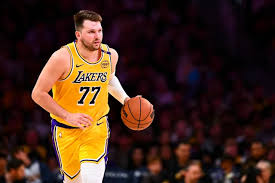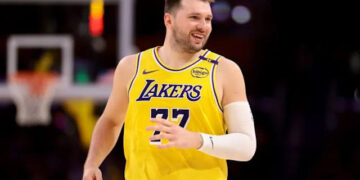NBA superstar Luka Dončić is known for his unmatched basketball IQ, fiery competitiveness, and calm demeanor off the court. But when a baseless accusation of homophobia surfaced online this week, the Dallas Mavericks star decided silence wasn’t an option.
The drama began after footage emerged of Dončić walking past a group of fans following a recent playoff game. One of the fans—who was later identified as a visible supporter of the LGBTQ+ community—extended a jersey and asked for a photo. Dončić, appearing exhausted and focused, declined and continued walking. The moment, innocuous to most, was clipped, shared, and captioned by a troll accusing him of being “homophobic.”

The post gained traction quickly, sparking debate among fans. But it didn’t take long for Dončić himself to respond—and he didn’t mince words.
“Not every ‘no’ means hate. Sometimes, it just means I’m tired, human, and have limits. I don’t care who someone is—I’ve taken pictures with everyone throughout my career. Don’t twist a moment into a message that was never there,” Dončić wrote on X (formerly Twitter), shutting down the claim with clarity and conviction.
He followed it up with a powerful statement on Instagram, writing:
“I respect every fan. I’ve signed thousands of autographs and posed for more photos than I can count. But nobody should be labeled with hate over a single out-of-context moment. Love is love, and respect goes both ways.”
Dončić’s reply was widely praised by both fans and fellow athletes, many of whom applauded him for standing up to the growing trend of social media outrage based on split-second moments. Teammate Kyrie Irving reposted the statement with the caption, “Real one. Always been about respect.” Former NBA player Dwyane Wade also chimed in, commenting, “Handled like a pro.”
LGBTQ+ advocacy group Athlete Ally issued a statement supporting Dončić’s response, saying, “Jumping to label individuals without evidence or context undermines the very causes we fight for. Luka Dončić has long shown respect to fans of all backgrounds.”
The situation highlights a broader issue that many public figures face in the age of viral content—where a clipped video and a provocative caption can create a false narrative in minutes. Dončić’s measured yet firm reply served not only as a defense of his character but also as a reminder that athletes are humans first.
In a time when speaking out can often feel like walking a tightrope, Luka Dončić chose grace over defensiveness, logic over emotion—and set the record straight.
























